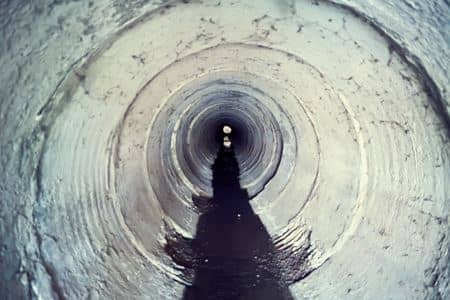What You Need to Know About Your Main Sewage Line

Your sewer or septic drain line has a special role: it’s not exactly part of the city sewer system (or your septic system), but it’s not exactly indoor plumbing either. Instead, it connects the two. Here’s what you need to know about the main sewage line.
1. You’re Responsible for Upkeep and Repairs
The sewage line may be referred to as a sewer line or drain line. When homeowners hear the phrase sewer line, they may assume that the term refers to part of the sewer system managed by the city.
However, this drain line on your property is actually your responsibility. It’s the main drain line that runs from your home to the city sewer. Usually, the sewer line doesn’t require a lot of care. However, you should have your plumber check it with a video line inspection on a periodic basis.
2. You Still Have a Sewage Line if You’re on Septic
Terminology can be confusing. The main drain line can often be called the main sewer line, so you would assume this means it’s a line that you don’t have if you aren’t on the city sewer. However, even if you have a septic system, you still have this main drain line; it simply leads to the septic tank rather than to the sewer hookup.
So when you read info about caring for your sewer line, don’t skip it just because you’re on a septic system. The line itself will be similar in purpose and design whether it leads to a city sewer or to your private septic system.
3. Clogging Is the Most Common Reason for Sewer Backups
Many sewer line backups are due to a clog of some kind. Whether it’s a tree root clog, a large ball of wet wipes, or some other type of blockage in the drain line, these clogs are one of the most common issues homeowners tend to notice with sewer lines.
In some cases, a clog is just the external manifestation or symptom of a larger issue. Clogs can occur because of issues such as:
- A tree root incursion in the line
- A line that takes a sharp turn, causing debris to build up in the line
- Too much grease in the wastewater
- A large amount of solid non-dissolvable waste (such as flushable wipes or dental floss)
As you can see, just knowing that a clog has formed won’t solve the issue. Taking a look with a video line inspection can help uncover the reason behind the clog.
4. Clogs and Leaks Require Professional Work
In addition to a professional video line inspection, you’ll need professional help to clear any clogs as well. Professional methods include things such as hydro-jetting, which can both remove the clog and scrub the inside of the pipe clean.
Another common issue that will require professional work is a leak in the drain line. As you can imagine, the water that inhabits the main drain line includes a lot of hazardous material such as human waste from your toilets. If the line is leaking, it will contaminate the surrounding soil and could even affect the groundwater.
5. Common Behaviors Can Have Serious Repercussions
You may have heard that you shouldn’t drive over your septic system, but did you know that driving over the sewer line could cause damage as well? Other common behaviors that can have serious repercussions for your main drain line include:
- Planting a tree too close to the line
- Flushing solid waste down your toilet
- Misusing your kitchen garbage disposal
You’ll want to avoid these problem behaviors if you want your drain line to last as long as possible.
These are five basic principles every homeowner should know about the main sewer line. For more information on caring for your plumbing system or to schedule an inspection, repair, or emergency visit, get in touch with Mitchell Plumbing, Heating and Cooling today.
Save With Our Preferred Customer Program
With our Preferred Customer Program, you can enjoy exclusive savings and benefits while keeping your home’s plumbing and HVAC systems running smoothly. Members of our Preferred Customer Program gain access to special offers and promotions throughout the year, making it easier and more affordable to keep your home comfortable. Whether it's seasonal HVAC tune-ups or plumbing inspections, you'll save time and money with our program. Sign up today and start enjoying the peace of mind that comes with being a preferred customer!
Learn More About Preferred Customer Program